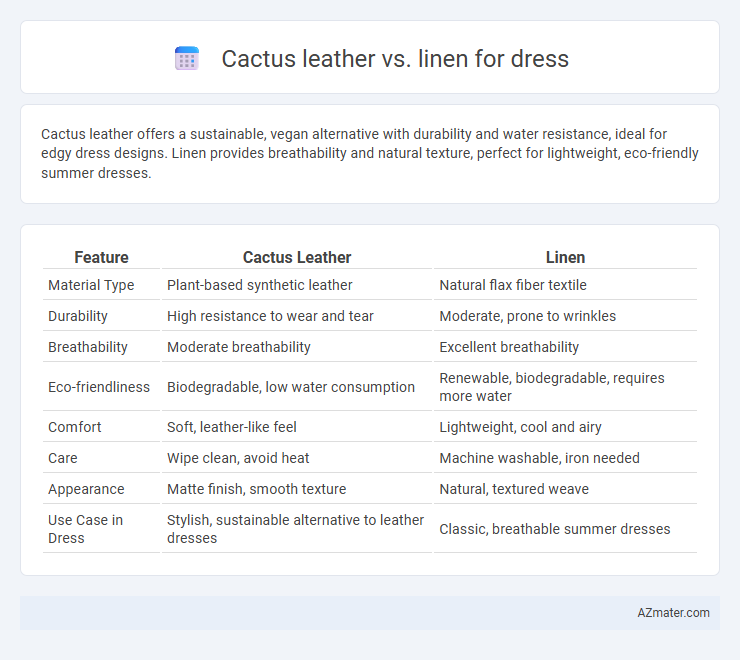Cactus leather offers a sustainable, vegan alternative with durability and water resistance, ideal for edgy dress designs. Linen provides breathability and natural texture, perfect for lightweight, eco-friendly summer dresses.
Table of Comparison
| Feature | Cactus Leather | Linen |
|---|---|---|
| Material Type | Plant-based synthetic leather | Natural flax fiber textile |
| Durability | High resistance to wear and tear | Moderate, prone to wrinkles |
| Breathability | Moderate breathability | Excellent breathability |
| Eco-friendliness | Biodegradable, low water consumption | Renewable, biodegradable, requires more water |
| Comfort | Soft, leather-like feel | Lightweight, cool and airy |
| Care | Wipe clean, avoid heat | Machine washable, iron needed |
| Appearance | Matte finish, smooth texture | Natural, textured weave |
| Use Case in Dress | Stylish, sustainable alternative to leather dresses | Classic, breathable summer dresses |
Introduction to Sustainable Fabrics: Cactus Leather and Linen
Cactus leather and linen represent innovative sustainable fabrics transforming eco-friendly fashion. Cactus leather, made from mature cactus leaves, offers a biodegradable and cruelty-free alternative to traditional leather, with durability and a natural texture. Linen, derived from flax fibers, is highly breathable, biodegradable, and requires minimal water and pesticides during cultivation, making it an eco-conscious choice for dressmaking.
What is Cactus Leather? Manufacturing and Properties
Cactus leather is a sustainable, plant-based material made from the mature leaves of the Nopal cactus, offering an eco-friendly alternative to traditional leather. The manufacturing process involves harvesting cactus leaves, drying them under the sun, and then crushing and blending them with non-toxic, biodegradable polyurethane to create a durable, flexible fabric. Known for its breathability, water resistance, and natural UV protection, cactus leather provides softness and strength ideal for dressmaking, combining style with environmental consciousness.
Understanding Linen: Origins and Characteristics
Linen, derived from the flax plant, is renowned for its exceptional breathability and natural moisture-wicking properties, making it ideal for warm-weather dresses. Its fibers create a durable, lightweight fabric with a distinctive texture and subtle luster, offering comfort and elegance. Originating from ancient cultures, linen remains a sustainable choice due to its biodegradability and minimal water usage during cultivation.
Environmental Impact: Cactus Leather vs Linen
Cactus leather significantly reduces environmental impact by using minimal water and avoiding toxic chemicals compared to conventional leather production, making it a sustainable alternative. Linen, derived from flax plants, also boasts eco-friendly properties by requiring less water and pesticides than cotton, and its cultivation supports soil health. Both materials offer lower carbon footprints, but cactus leather stands out for its innovative use of agricultural waste and biodegradability in fashion applications.
Comfort and Wearability Compared
Cactus leather offers a soft, flexible texture that adapts well to body movements, providing enhanced comfort for dress wearers, while linen is lightweight and highly breathable, making it ideal for warm weather. Both materials excel in moisture-wicking properties, but linen's natural fibers ensure superior airflow, reducing perspiration buildup. In terms of wearability, cactus leather has greater durability and resistance to wrinkles compared to linen, which tends to crease easily but remains highly valued for its relaxed, casual aesthetic.
Durability and Longevity: Which Fabric Lasts Longer?
Cactus leather offers superior durability compared to linen, resisting wear, tears, and moisture over time, making it an excellent choice for long-lasting dresses. Linen, while breathable and comfortable, tends to wear out faster due to its natural fibers, showing fraying and thinning with frequent use and washes. Dresses made from cactus leather typically maintain their appearance and structure significantly longer than linen garments.
Style and Aesthetics in Dress Design
Cactus leather offers a sleek, modern aesthetic with a smooth, slightly glossy finish that adds a contemporary edge to dress designs, ideal for bold, fashion-forward styles. Linen provides a natural, textured appearance with a matte finish, bringing a relaxed, organic feel perfect for casual or bohemian-inspired dresses. The choice between cactus leather and linen significantly influences the dress's overall visual impact, balancing between avant-garde sophistication and earthy simplicity.
Maintenance and Care Requirements
Cactus leather requires minimal maintenance, needing only occasional wiping with a damp cloth to preserve its durability and water resistance, making it ideal for dress fabrics exposed to outdoor conditions. Linen, while breathable and comfortable, demands more care including gentle washing, avoiding high heat, and frequent ironing to prevent wrinkles and maintain fabric integrity. Both materials have eco-friendly aspects, but cactus leather offers superior ease of care for long-lasting dress wear.
Cost Comparison and Market Availability
Cactus leather typically costs more than linen due to its sustainable production process and innovative material properties, appealing to eco-conscious consumers willing to invest in premium fabrics for dresses. Linen remains widely available and affordable in global markets, benefiting from established supply chains and natural fiber demand. Market availability favors linen with its mass production and extensive distribution, while cactus leather is niche but growing, primarily found in specialty boutiques and online eco-fashion retailers.
Which is Better for Dresses: Cactus Leather or Linen?
Cactus leather offers a sustainable and vegan alternative with durability and a smooth texture, making it ideal for structured and statement dresses. Linen, a natural fiber, excels in breathability and moisture-wicking properties, perfect for lightweight, casual, and summer dresses. For dresses emphasizing eco-friendly fashion with unique aesthetics, cactus leather is better, while linen suits comfort and classic style preferences.

Infographic: Cactus leather vs Linen for Dress
 azmater.com
azmater.com